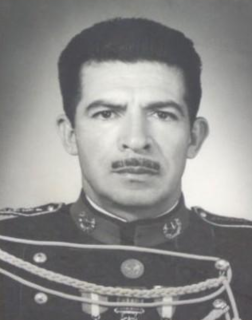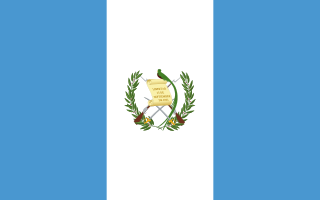
Central America is a region of the Americas. It is bordered by Mexico to the north, Colombia to the southeast, the Caribbean Sea to the east and the Pacific Ocean to the west and south. Central America consists of seven countries: El Salvador, Costa Rica, Belize, Guatemala, Honduras, Nicaragua and Panama. The combined population is estimated at 44.53 million (2016).

Guatemala City, locally known as Guatemala or Guate, officially Ciudad de Guatemala, is the capital and largest city of Guatemala, and the most populous urban area in Central America. The city is located in the south-central part of the country, nestled in a mountain valley called Valle de la Ermita. It is estimated that its population is about 1 million. Guatemala City is also the capital of the Municipality of Guatemala and of the Guatemala Department.

The economy of Guatemala is a less-developed economy that is dependent on traditional crops such as coffee, sugar, and bananas. Guatemala's GDP per capita is roughly one-third of Brazil's. The 1996 peace accords ended 36 years of civil war and removed a major obstacle to foreign investment. Since then Guatemala has pursued important reforms and macroeconomic stabilization. On 1 July 2006, the Central American Free Trade Agreement (CAFTA) entered into force between the US and Guatemala and has since spurred increased investment in the export sector. The distribution of income remains highly unequal, with 12% of the population living below the international poverty line. Guatemala's large expatriate community in the United States, has made it the top remittance recipient in Central America. These inflows are a primary source of foreign income, equivalent to nearly two-thirds of exports.

Antigua Guatemala, commonly referred to as just Antigua or la Antigua, is a city in the central highlands of Guatemala known for its preserved Spanish Baroque-influenced architecture as well as a number of ruins of colonial churches. It served as the capital of the Kingdom of Guatemala. It has been designated a UNESCO World Heritage site.

The Federal Republic of Central America, also called the United Provinces of Central America in its first year of creation, was a sovereign state in Central America that consisted of the territories of the former Captaincy General of Guatemala of New Spain. It existed from July 1823 to February 1841, as a republican democracy.

José Efraín Ríos Montt was a Guatemalan general, politician, and war criminal who served as President of Guatemala. Born in Huehuetenango, he was a dictator who took power as a result of a coup d'état on March 23, 1982. He was overthrown by his defense minister, Óscar Humberto Mejía Victores, in another coup d'état on August 8, 1983. In the 2003 presidential elections, Ríos Montt unsuccessfully ran as the candidate of the Guatemalan Republican Front (FRG). In 2007 he returned to public office as a member of Congress, thereby gaining prosecutorial immunity. He was protected from a pair of long-running lawsuits alleging war crimes against him and a number of his former ministers and counselors during their term in the presidential palace in 1982–83. His immunity ended on January 14, 2012, with the end of his term in legislative office. On January 26, 2012, he appeared in court in Guatemala and was formally indicted for genocide and crimes against humanity.

The President of Guatemala, officially known as the President of the Republic of Guatemala, is the head of state and head of government of Guatemala, elected to a single four-year term. The position of President was created in 1839.

The Maya peoples are an ethnolinguistic group of indigenous peoples of Mesoamerica. The ancient Maya civilization was formed by members of this group, and today's Maya are generally descended from people who lived within that historical civilization. Today they inhabit southern Mexico, Guatemala, Belize, El Salvador and Honduras. "Maya" is a modern collective term for the peoples of the region, however, the term was not historically used by the indigenous populations themselves. There was no common sense of identity or political unity among the distinct populations, societies and ethnic groups because they each had their own particular traditions, cultures and historical identity.

Guatemala is divided into 22 departments which are in turn divided into 340 municipalities.

The 1954 Guatemalan coup d'état, code-named Operation PBSuccess, was a covert operation carried out by the U.S. Central Intelligence Agency (CIA) that deposed the democratically elected Guatemalan President Jacobo Árbenz and ended the Guatemalan Revolution of 1944–1954. It installed the military dictatorship of Carlos Castillo Armas, the first in a series of U.S.-backed authoritarian rulers in Guatemala.

The Congress of the Republic is the unicameral legislature of the Republic of Guatemala. The Guatemalan Congress is made up of 160 deputies who are elected by direct universal suffrage to serve four-year terms. The electoral system is closed party list proportional representation. 31 of the deputies are elected on a nationwide list, whilst the remaining 127 deputies are elected in 22 multi-member constituencies. Each of Guatemalas's 22 departments serves as a district, with the exception of the department of Guatemala containing the capital, which on account of its size is divided into two (distrito central and distrito Guatemala). Departments are allocated seats based on their population size and they are shown in the table below.

The Guatemala national football team represents Guatemala in men's international football and is controlled by the Federación Nacional de Fútbol de Guatemala. Founded in 1919, it has been affiliated to FIFA since 1946, and it is a member of CONCACAF.

The Captaincy General of Guatemala, also known as the Kingdom of Guatemala, was an administrative division of the Spanish Empire, under the viceroyalty of New Spain in Central America, including the present-day nations of Costa Rica, Nicaragua, Honduras, El Salvador, and Guatemala, and the Mexican state of Chiapas. The governor-captain general was also president of the Royal Audiencia of Guatemala, the superior court.

The Guatemalan Civil War was a civil war in Guatemala fought from 1960 to 1996 between the government of Guatemala and various leftist rebel groups. These were supported by ethnic Maya indigenous peoples and Ladino peasants, who together make up the rural poor. The government forces have been condemned for committing genocide against the Maya population of Guatemala during the civil war and for widespread human rights violations against civilians. The context of the struggle was based on longstanding issues of unfair land distribution; European-descended residents and foreign companies, such as the American United Fruit Company, had dominated with control over much of the land, conflicting with the rural poor.

Most traditional foods in Guatemalan cuisine are based on Maya cuisine, with Spanish influence, and prominently feature corn, chilies and beans as key ingredients. Guatemala is famously home to the Hass avocado and the birthplace of chocolate, as first created by the Mayans.
Guatemalan Americans are Americans of full or partial Guatemalan descent. The Guatemalan American population at the 2010 Census was 1,044,209. Guatemalans are the sixth largest Latin/Hispanic group in the United States and the second largest Central American population after Salvadorans. Half of the Guatemalan population is situated in two parts of the country, the Northeast and Southern California.

Guatemala, officially the Republic of Guatemala, is a country in Central America bordered by Mexico to the north and west, Belize and the Caribbean to the northeast, Honduras to the east, El Salvador to the southeast and the Pacific Ocean to the south. With an estimated population of around 17.2 million, it is the most populous country in Central America and has the 11th largest national population in the Americas. Guatemala is a representative democracy; its capital and largest city is Nueva Guatemala de la Asunción, also known as Guatemala City.
Miss Guatemala is a national Beauty pageant in Guatemala.

The COVID-19 pandemic in Guatemala is part of the worldwide pandemic of coronavirus disease 2019 caused by severe acute respiratory syndrome coronavirus 2. The virus was confirmed to have reached Guatemala in March 2020.
Anarchism in Guatemala emerged from the country's labor movement in the late 19th century. Anarcho-syndicalism rose to prominence in the early 20th century, reaching its peak during the 1920s, before being suppressed by the right-wing dictatorship of Jorge Ubico.


















